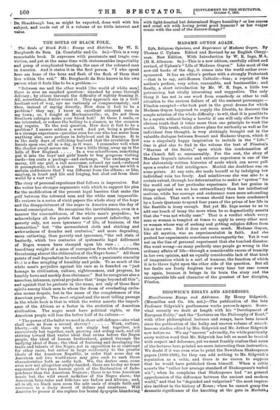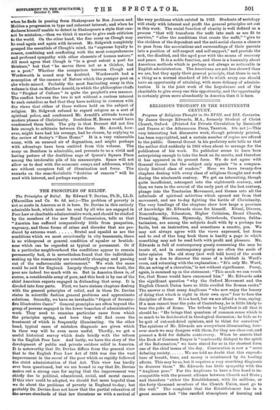MADAME GUYON AGAIN.
Life, Religious Opinions, and Experience of Madame Guyon. By Thomas C. Upham. Edited and Revised by an English Clergy- man. New Edition. With Introduction by W. R. Inge, MIA. (H. R. Allenson. 6s.)—This is a new edition, carefully edited and revised, of Upham's "Life of Madame Guyon." Like most of the new-old books of the day, it comes into the world rather over- sponsored. It has an editor's preface with a strongly Protestant —that is to say, anti-Roman Catholic—bias; a reprint of the author's preface, very sober, reasonable, and businesslike ; and finally, a short introduction by Mr. W. R. Inge, a little too patronising, but vitally interesting and suggestive. The only thing it has not is one word from somebody or other to call attention to the curious failure of all the eminent personages- Fenelon excepted—who took part in the great drama for which Madame Guyon happened to supply the libretto, to discover the simple solution of the whole difficulty : to wit, that it is possible to be a mystic without being a heretic if one will only allow for the obvious truth that it takes more than ono principle to work the world. This truth, which allows place for authority as well as for individual free thought, is very strikingly brought out in the valuable dialogue between Bossuet and Madame Guyon, which it was a singularly happy inspiration to include in the "Life." One is glad also to find in the volume the text of Fenelon's "Maxims of the Saints," upon which the condemnation of the Church fell so unreasonably. For the rest, the story of Madame Guyon's interior and exterior experience is one of the few elaborately written histories of souls which can never pall upon a reader of full intelligence. Morbid she doubtless was on some points. At any rate, she made herself so by indulging her individual vein too freely. And mischievous she was also to a certain extent, through her determination to make a " system " for the world out of her particular experience. But her genius in things spiritual was no less extraordinary than her intellectual snail rise, while her courage and endurance were more astounding than either. That such a woman should have been condemned by a Louis Quatorze to spend four years of the prime of her life in the Bastille is irony enough. But yet Mr. Inge seems to us to add one touch of irony the more when he so dogmatically asserts that she "was not wholly sane." That is a verdict which every man or woman is tempted at times to apply to every other man or woman whose way of seeking and getting religion differs from his or her own. But it does not mean much. Madame Guyon, like all mystics, was an experimentalist in faith. And she pushed her experiments sometimes extravagantly far. Yet it was not on the line of personal experiment that she touched disaster. She went wrong—as many perfectly sane people go wrong in the ordinary affairs of life—through a considerable excess of tenacity in her own opinion, and an equally considerable lack of that kind of imagination which is a sort of humour, the function of which it is to throw light upon the other side of the question. But all her faults are freely forgiven her every time her case comes up again, because it brings in its train the story and the incomparable life and character of the greatest of her disciples, Fenelon.
SIDGWICK'S ESSAYS AND ADDRESSES.
Miscellaneous Essays and Addresses. By Henry Sidgwick. (Macmillan and Co. 10s. net.)—The publication of the late Professor Sidgwick's posthumous works proceeds apace. Some- what recently we dealt at length with his "Development of European Polity," and the "Lectures on the Philosophy of Kant," with other philosophical lectures and essays, have been issued since the publication of the bulky and uneven volume of miscel- laneous studies edited by Mrs. Sidgwick and Dlr. Arthur Sidgwick now before us. We say "uneven" advisedly, for while practically every written word that Mr. Sidgwick has left us must be treated with respect and deference, yet we must frankly confess that some of the lectures here printed are more interesting than instructive. We doubt if it was even wise to print the Newnham Shakespeare papers (1889-1898), for they can add nothing to Mr. Sidgwick's reputation as a critic, and there is no reason to suppose that he would have published them himself. When a critic asserts the "rather low average standard of Shakespeare's verbal wit" ; when he complains that Shakespeare had "no general apprehension of the difference between the ancient and modern world," and that he "degraded and vulgarised" the most impres- sive incident in the history of Rome ; when he cannot grasp the dramatic significance of the knocking at the gate in Macbeth; when he finds in passing from Shakespeare to Ben Jenson and Molibre a progression in type and coherent interest; and when he declares himself unable to detect in Shakespeare a style that can- not be mistaken,—then we think it unwise to give such criticism to the world. On the other hand, the fine essay on Clough may be read again and again with interest. Mr. Sidgwick completely grasped the essentials of dough's mind, its "supreme loyalty to reason, combining and conflicting with the most comprehensive and profound sympathy with other elements of human nature." All must agree that Clough is "to a great extent a poet for thinkers," but that "he moves them not as a thinker, but as a poet." Whether the comparison between Clough and Wordsworth is sound may be doubted. Wordsworth had a conception of the oneness of Nature which the younger poet on the whole missed. Probably the most fascinating essay in this volume is that on Matthew Arnold, in which the philosopher chaffs the "Prophet of Culture" in quite the prophet's own manner. The conflict between the two is not without a curious interest to such outsiders as feel that they have nothing in common with the views that either of these writers held on the subject of religion. Mr. Sidgwick refused to regard religion as a sort of spiritual police, and condemned Mr. Arnold's attitude towards modern phases of Christianity. Doubtless M. Renan would have condemned them both. The pity is that Bossuet did not live late enough to arbitrate between the three. Mr. Arnold, how- ever, might have had his revenge, had he chosen, by replying to the review of Seeley's "Ewe Homo." It is a very vulnerable essay, with an unusual air of dogmatism, and might perhaps with advantage have been omitted from this volume. The essay on Bentham is admirable, and presents to us a vivid and lasting picture of the deathless sage of Queen's Square Place among the intolerable pile of his manuscripts. Space will not allow us to deal with the economic essays and addresses, which are without exception full of illumination and force. The remarks on the semi-Socialistic "doctrine of ransom" will be read with interest, and perhaps surprise.
THE PRINCIPLES OF RELIEF.
The Principles of Relief. By Edward T. Devine, Ph.D., LL.D. (Macmillan and Co. 8s. 6d. net.)—The problem of poverty is not so acute in America as it is here. Dr. Devine in this entirely admirable book, which must be read by all who are engaged in Poor Law or charitable administrative work, and should be studied by the members of the new Royal Commission, tells us that "America has suffered comparatively little from pauperism, vagrancy, and those forms of crime and disorder that are pro-



























































 Previous page
Previous page